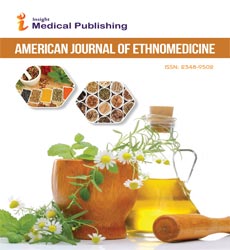ISSN : 2348-9502
American Journal of Ethnomedicine
The Ancient Use of Herbal Medicine
Michel Phair*
Department of Medicine, University of Kashihara, Sousse, Tunisia
- *Corresponding Author:
- Michel Phair
Department of Medicine, University of Kashihara, Sousse, Tunisia
E-mail: michelphairac@gmail.com
Received Date: September 07, 2021; Accepted Date: September 21, 2021; Published Date: September 28, 2021
Citation: Phair M (2021) The Ancient Use of Herbal Medicine. Am J Ethnomed Vol.8 No.8: 001
Description
The practice of herbal medicine history back to prehistoric times when people discovered through trial and error that certain plants had healing powers. Herbal remedies were coded and eventually compiled into books during the ancient civilizations of India, China, Egypt, Persia, and Greece. Traditional herbal medicines make up a large part of drug use, often in combination with allopathic medicines. Different cultures use herbs, located in their geographic locations, in different ways to cure common diseases. Aromatherapy is the use of oils made from herbs and other aromatic plants to provide relaxation or relief from illness. Ayurveda and Chinese herbal medicine are ancient healing systems from India and China that emphasize the mind-body relationship to maintain good health.
Traditional Herbal Medicines
Herbal medicines are also known as herbalism. The ancient Indians, Chinese and Europeans discovered the origins of medicinal herbs. Europeans used them successfully for healing purposes. The records are available in ancient tests on the laboratory. In India itself, many medicinal plants grow in wild forests. Rather, they are used by tribes to earn a living in some belts, where they are cultivated in the wild. Unlike in India, increasing demand for traditional medicines. China has led the government to allow these plants to grow for further research and development. Many plant species, cultivated for their medicinal value. Medicinal herbs are used in Ayurveda, naturopathy and homeopathy, traditional and Native American medicines. The species of plants are used in modern medicine. They are bought from the rainforests. Since health care is important in all over the world, it is strange that herbal medicines are used silently without consulting a doctor. They are purchased over the counter or by unqualified people who make them. Since they have hardly any side effects, only a few drugs are in circulation, especially in India and China. If combined by general practitioners and physicians with allopathic drugs for patients with chronic problems, it could be a positive step towards medical care. Because they are inexpensive, they are well within the budget of long-term care patients.
With the development of chemistry and the refinement of laboratory methods, herbal medicine gave way to the modern pharmaceutical industry, in which many drugs are manufactured in test tubes. Still, herbal ingredients are found in nearly half of all prescription and over-the-counter drugs used in mainstream medicine, including aspirin, digitalis, and atropine, and various anticancer drugs. Herbal medicine in China has been a wellorganized knowledge system based on observation, experimentation, and clinical study for centuries, and modern science has confirmed the efficacy of a considerable number of these remedies. Elsewhere, a consortium of medical researchers, pharmaceutical companies, and herbalists have made the latest plant-coding efforts studying the flora of the rainforest in hopes of discovering new plant resources that can cure heart disease, cancer, AIDS, and more mortal diseases.
Herbal medicine is the specialty of people who call themselves herbalists. It is also part of homeopathy, naturopathy, and aromatherapy, as well as the mainstay of selfproclaimed holistic healers, some with acceptable and many without. Chinese herbal medicine is popularized in the West by acupuncturists and other practitioners of Oriental medicine. Many health food store vendors also consider themselves qualified to recommend the use of herbal extracts. After all, many home remedies are based on herbal supplements.
Herbal medicines that produce a desired result contain substances in laboratory analysis that trigger specific biochemical reactions. Some herbalists still recommend white willow as a treatment for headaches, arthritis, and other painful conditions, claiming that it is less likely to cause an upset stomach and other aspirin side effects. Therefore, the consumer has no way of knowing whether an herbal product has been scientifically tested for safety and efficacy. FDA regulations require that herbal products be marketed as foods or food additives and that their labels contain no specific medical claims or dosage information contains. Therefore, people who use herbal remedies generally turn to books or rely on the advice of an herbalist or other health professional.
Open Access Journals
- Aquaculture & Veterinary Science
- Chemistry & Chemical Sciences
- Clinical Sciences
- Engineering
- General Science
- Genetics & Molecular Biology
- Health Care & Nursing
- Immunology & Microbiology
- Materials Science
- Mathematics & Physics
- Medical Sciences
- Neurology & Psychiatry
- Oncology & Cancer Science
- Pharmaceutical Sciences
